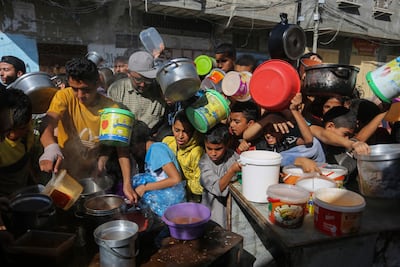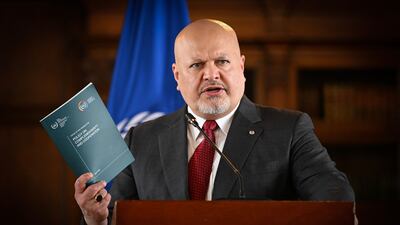International Criminal Court Prosecutor Karim Khan looked steely eyed on Monday afternoon, flanked at a podium by two members of his staff, as he looked into the camera and read out a charge sheet that is sure to shake the world as it continues to struggle with a war in Gaza that has killed more than 35,000 Palestinians.
Mr Khan began by noting that his offices are seeking arrest warrants from the court’s judges for top officials of Hamas, responsible for the October 7 attack that led to at least 1,200 Israeli deaths. But far more consequential is what he said after that.
“I have reasonable grounds to believe, on the basis of evidence collected and examined by my office, that Israeli Prime Minister Benjamin Netanyahu and Minister of Defence Yoav Gallant bear criminal responsibility,” Mr Khan said, for a range of grave offences against international humanitarian law allegedly committed by Israeli soldiers in Gaza.
Mr Khan has cited several possible charges, all of them within the scope of two of the four crimes the ICC deals with: crimes against humanity and war crimes. The other two, genocide and aggression, were not included.
As predicted by many international law experts ever since rumours of these charges arose last month, the first crime Mr Khan mentioned was “starvation as a method of warfare”, a war crime under Article 8(2)(b)(xxv) of the court’s founding document, the Rome Statute. It was predictable because there is overwhelming, publicly available evidence that the Israeli military has, for much of its ongoing war against Hamas in Gaza, denied Gazans as a whole access to humanitarian supplies, including food and water.

Starvation, moreover, is easier to prove compared to other war crimes – such as targeting or disproportionately killing civilians – because the evidence needed to prove them is often more subjective. That said, this case stands out because it could be the first time the charge is prosecuted at the ICC.
And Mr Gallant appears particularly at fault. On October 9, the day after Israel began its military response to Hamas’s October 7 massacre of Israeli civilians, he essentially recorded his own confession tape. Sitting in a meeting room in Israel’s Southern Command, he told a group of officers in a video that was subsequently published by his own forces: “We are putting a complete siege on Gaza. No electricity, no food, no water, no petrol. It’s all closed. We’re fighting human animals, and we’re acting accordingly.”
Mr Khan elaborated that order in his statement: “The siege also included cutting off cross-border water pipelines from Israel to Gaza – Gazans’ principal source of clean water – for a prolonged period beginning 9 October 2023, and cutting off and hindering electricity supplies from at least 8 October 2023 until today. This took place alongside other attacks on civilians, including those queuing for food; obstruction of aid delivery by humanitarian agencies; and attacks on and killing of aid workers, which forced many agencies to cease or limit their operations in Gaza.”
Mr Netanyahu’s connection to the charge will presumably rest on the likelihood that he, as Prime Minister, directed Mr Gallant in such a manner, as well as any other statements or orders he has made further supporting it.
If the warrants are issued and Mr Netanyahu and Mr Gallant choose to defend themselves in court, their lawyers may rely on a narrow reading of Article 8(2)(b)(xxv). The text, in full, reads: “intentionally using starvation of civilians as a method of warfare by depriving them of objects indispensable to their survival, including wilfully impeding relief supplies as provided for under the Geneva Conventions.”
“Objects indispensable” include sustenance, like food and water. When it comes to war crimes, however, the narrow reading means withholding these objects from civilians is only a crime if it is done with the specific purpose (i.e. intentionally) of inducing starvation of civilians as a weapon (i.e. a method of warfare).

But what if the intention was not to weaponise starvation? What if starvation of civilians is a byproduct of the real intention, which is to deprive enemy combatants of their sustenance?
Israeli military lawyers are highly practised in the argument of “military necessity”, a well-established principle of international humanitarian law. They might argue that in the highly urbanised environment of Gaza, it is impossible to deprive Hamas of sustenance without doing the same to civilians. The purpose, they would say, is not to weaponise the starvation of civilians.
Tom Dannenbaum, an associate international law professor at Tufts University, has argued forcefully that such an interpretation of the law is fundamentally incorrect, on the basis that even the military necessity principle is overridden by the greater imperative to protect civilian lives whenever possible. He compares wholesale starvation of the population to carpet-bombing the same population. “Why would it be any different if what we’re looking at is deprivation directed at that population as a whole as compared to a kinetic attack directed at that population as a whole?” In the latter scenario, stating that the intent is to target militants wouldn’t hold up – carpet-bombing a population of predominantly civilians is clearly prohibited in all instances.
It is telling that Mr Khan, in his warrant application, has cited starvation not only as a war crime, but as a crime against humanity. Using the same underlying facts to charge two separate crimes is a contentious move, and lawyers will debate the merits of that: if Israel’s starvation of Gazans is deemed not to have been a war crime, then could it be a crime against humanity?
As Mr Khan says, the starvation allegations also support charges of murder and extermination. The latter is a crime against humanity specifically involving “the deprivation of access to food and medicine, calculated to bring about the destruction of part of a population”. That bar will be a high one to clear because of the necessity to prove Israel’s blockades were a calculated effort to destroy Gazans.
It is unlikely that all of Mr Khan’s charges against Mr Netanyahu and Mr Gallant will stick. The Prosecutor makes calculations of his own, and part of that is casting his legal net as widely as possible.


